On November 9, 26 students and two faculty were arrested by the University of Chicago Police Department (UCPD) during a sit-in at Rosenwald Hall in protest of the University’s investments in institutions complicit in the genocide of Palestinians. Though legal charges have been dropped, the University’s disciplinary process is ongoing. Gathered here are excerpts from statements sent by student arrestees to Associate Dean of Students Jeremy Inabinet of the Center for Student Integrity, which we were required to submit in order to address charges brought against us by another associate dean of students through the University’s “disruptive conduct” disciplinary process. Administrators have repeatedly tried to push pro-Palestine narratives into the shadows, away from the public eye, including by weaponizing UCPD and the Dean-on-Call program against student protestors, processing our arrests inside a university building to avoid the large crowd outside, and subjecting us to an internal disciplinary process under the dean of students—the very university structure that filed the disciplinary complaint against us and that likely authorized our arrest.
The administration’s shadowy structure of evasion and disavowal is essential to understanding how “free speech” actually operates on the ground. It serves to protect University executives and the University’s investments while disavowing the obligations that free speech entails: to protect our rights and seriously engage with our concerns. These shadowy processes serve only to hide glaring contradictions between the University’s actions suppressing pro-Palestinian voices and its lauded commitment to free expression. At the heart of this contradiction between our university’s stated policy and actual actions on campus is the delegitimization of the Palestinian struggle for liberation and, ultimately, the dehumanization of Palestinians.
We share the following letter excerpts to expose and condemn the University’s failure to protect our rights to free expression, as well as its bad faith promise to uphold “political neutrality” on our campus. Despite all of our efforts, the administration has never agreed to meet with us. Instead, President Alivisatos has since met publicly with the Israeli Consul General to strengthen ties to Israeli institutions in the middle of a genocide, while disciplining Palestinian students and their allies. In such a climate of blatant non-neutrality and suppression, we come forward openly and share our statements, which would otherwise be arbitrated behind closed doors.
_____________________________________________________________________
[1]
“I am disturbed to have to write this letter to explain my presence at a peaceful, anti-genocide action that took place in Rosenwald Hall on November 9. The University’s response to this action reflects a highly securitized and carceral approach that actively chills student voices and directly contradicts its “commitment to free speech.” I am complying with this request for my testimony because of an asymmetrical balance of power between myself, as a grad student, and the University, who is my employer. I want to be clear, however, that I condemn all of the University’s disciplinary actions including closing off entrances to Rosenwald with a team of armed police, arresting students and faculty, and lodging investigations against them. I find it reprehensible that the University should be investigating students who participated in a peaceful protest when the true injustice is that there is an ongoing genocide that has killed at least 22,000 Palestinians, displaced 1.5 million and left 25,000 children without parents.
My office is on the 3rd floor of Rosenwald Hall. On Nov. 9, I was upstairs working, unaware of the tensions below. I could not hear chanting nor was I aware of any disturbance provoked by the sit-in. When I went downstairs to exit the building, taking the same route I always do through the admissions office, I realized there was a significant police presence and I became concerned for the students. As a lifetime activist who has seen police brutality play out in many settings including peaceful protest, I do not trust police. I especially do not trust police if they have been called upon to intimidate unarmed students. I stayed in the admissions office with the intention to witness, hoping that the presence of an observer might disincentivize any potential abuse by the police officers. I stayed until the last student was arrested because I am committed to the safety of the University community and feel a sense of allegiance to the undergrad students of UChicago generally, as I have shared class and discussions with them, TA’d for them, and developed for them a sense of respect and affection….”
Anonymous, Ph.D. Student
_____________________________________________________________________
[2]
“… Before this experience, I was a huge advocate for the University of Chicago. I represented the school to hundreds of prospective students on campus, hundreds of parents on the phone when I worked in admissions, and millions of students online through my platforms. I was even chosen to represent UChicago at an admissions fair at Emory in Atlanta, Georgia, which I did. Because of a complaint from someone who wasn’t present, I now have a criminal record for asking the University to stop killing my family. I do not think I disrupted anything by sitting for a few hours, making art, and completing my assignments. If that were true, then I should be arrested every day I’m on campus. I am appalled, as a mourning student, the University has not supported me in any capacity and is, in fact, part of the reason I’m mourning. I worry about disciplinary hearings, court dates, and a criminal record instead of praying the last time I saw certain family members won’t truthfully be the last time. Hasn’t UChicago taken enough from me? An institution that was once my dream school has become my nightmare. I deserve better, Palestinians deserve better…”
Youssef Hasweh, Class of 2024
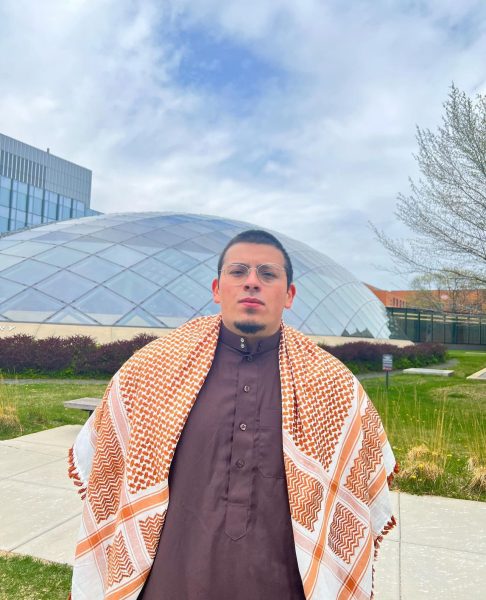
_____________________________________________________________________
[3]
“… I signed petitions to university administration, including UChicago United for Palestine’s (UCUP) call for divestment and solidarity with Palestine. I attended peaceful rallies, at which UCUP clearly articulated its demands to the University community. I participated in tabling on the quad, which has done more to facilitate free, direct, and honest campus discussion about the events in Palestine than the University’s policy of silence. I helped create public art to memorialize the lives lost to atrocities in Gaza, which the University removed multiple times. After I had done all of this and received no response from university administration, who have refused even to meet with student representatives from UCUP, what course of action was left open to me? Could I bury my head in Jane Austen, attend my classes and write my Canvas posts in willful ignorance, pretend not to know what I knew? Of course not: because no classroom should be built on the rubble of another classroom.
Since Israel’s renewal of its intensive bombing campaign against Gaza on October 7, over 51 percent of Gaza’s educational facilities have been hit and 100 percent of Gaza’s students have lost educational access, according to the United Nations (UN). Israel has destroyed major universities in Gaza, including the Islamic University of Gaza and Al-Azhar University, part of a pattern of targeting civilian infrastructure in blatant violation of international law. A coalition of Palestinian higher education institutions has issued a call for international academic institutions to:
- Call for an immediate humanitarian ceasefire, guaranteed by the UN.
- Urge immediate entry into Gaza of sufficient amounts of life-saving humanitarian needs (including water, food, fuel, medicine), equitably distributed throughout the whole territory of Gaza Strip.
- Demand UN protection for the 2.3 million Palestinian civilians trapped under siege in Gaza.
- Issue clear positions rejecting any ethnic cleansing.
- To support in dismantling the settler colonial and apartheid system and to achieve a just, comprehensive, and lasting peace.
In response, major U.S. academic institutions like UChicago have silently continued to profit from the destruction of civilian infrastructure like universities and the slaughter of innocent Palestinians…”
Sammy Aiko Zimmerman, Class of 2024
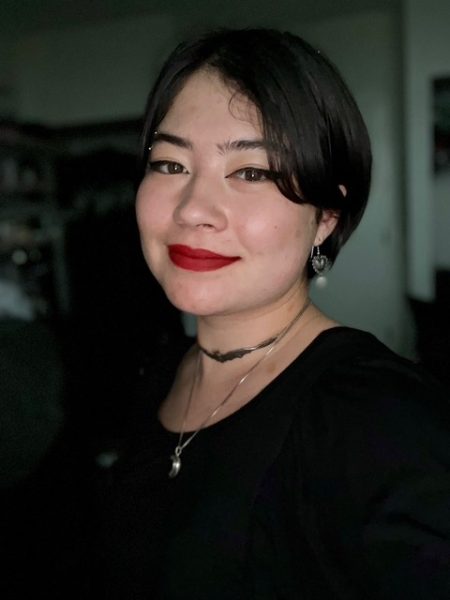
_____________________________________________________________________
[4]
“… I, as a researcher, who has colleagues and interlocutors in Jerusalem that wake up every morning to the brutal discrimination of an apartheid government; as a person with loved ones throughout Palestine, Lebanon, Iraq, and Iran; as a U.S. citizen; and as a UChicago student, joined the student protest. I decided that the administration’s continued refusal to address our concerns, clarify its position, or meet with us transparently had disrupted our lives and the work of the University in accordance with its stated values to such an extent that I had an ethical obligation to engage in principled protest on November 9.
The complaint that has been filed against me alleges that I was the one who substantially disrupted university operations on that day.…In my view, the administration’s mobilization of a police response by Deans-on-Call and UCPD in response to the protest was actually escalatory and disruptive to university operations, as their disregard and dismissal of student needs and concerns on divestment throughout the quarter has been. Indeed, the pressure of this disciplinary process has compounded my obligations in the face of immense community grief, not to mention my final exams and work obligations. The sheer amount of resources UChicago administration has put towards punishing the students of November 9, and the amount of collective resources that have had to be marshaled to protect ourselves in response, is stunning when we recognize that it all could be avoided with a meeting within the UChicago community, including administrative decision makers, students, and faculty….
We have repeatedly heard from administrators such as Dean Rasmussen that the University does not invest or divest on the basis of politics and that it does not invest in anything illegal. But according to the facts and expert opinions presented by all prominent international human rights organizations, and UN representatives, it is not particularly controversial that Israel, which is already considered an apartheid regime, from the river to the sea, by B’Tselem, Amnesty International and Human Rights Watch, is committing crimes against humanity and breaking international law in its war on besieged Gaza. So, given all this, I’ve had to confront the question of how, as a student, I am to respond to the calls for help by young children who have lost thousands of their peers and are being starved and bombed outside hospitals. How should I fulfill my democratic responsibilities, as horrific crimes are committed in my name as a U.S. citizen? How should I handle the weight of complicity, as my own university “apolitically” invests in these attacks?
We have all heard numerous times that the University of Chicago has articulated principles on political neutrality in its Kalven Report, discouraging administrators from taking a stance on socio-political issues outside of the University in the name of preserving free expression. The University’s stance on institutional political neutrality, said to preserve the principle and practice of free inquiry and critique at the departmental, faculty, and student level is admirable at first sight. But the further I have inspected it and observed its consequences, the more it seems to mask a refusal to challenge status-quo power relations which are destroying free expression, and the possibility of education itself. How can UChicago administrators claim to uphold core values and principles of free expression by ignoring the student body’s calls for a meeting, mechanically citing the Kalven Report to the media, and passively watching Israel systematically target journalists, drop bombs on university buildings in the Gaza Strip, and brutally incarcerate our fellow students at Birzeit University without charge? Is the appropriate ethical attitude to wait until after the genocide is consummated and only then hold an intellectually challenging history seminar about it?…”
Hassan Doostdar, Class of 2025
_____________________________________________________________________
[5]
“… Since October 7… I have watched weapons made by such companies as Boeing, Raytheon, Lockheed Martin, and Northropp Grumman snuff out the lives of 20,000 people in Gaza, including over 7,000 children. I think of Palestinian friends on campus, who have relatives in Gaza and the West Bank; Palestinian instructors in Amman, who helped me become fluent in their language and get into UChicago in the first place; and Palestinians in the West Bank, who showed me kindness and generosity despite living their entire lives under a U.S.-backed military occupation. For UChicago to conceal and maintain ties to the slaughter of these people’s brothers and sisters is political action, and it aids and abets violations of international law.
Yet administrators have continued to avoid engaging with dissent. In an interview with The Maroon, a fellow protestor underscored how many times administrators have ignored the modest call for a public meeting: “It’s very important to emphasize that [the sit-in] was not our first step, it wasn’t our second step, it wasn’t our third step, or our fourth step.”
It seems that the core of what administrators find disruptive and unconducive to “university business” is not peaceful protests, but their own obligations. To try and uphold my responsibility as a member of the campus community, I protested in the lobby of Rosenwald on November 9. The sign that I held read “Never again for anyone,” in reference to something that several Jewish friends and colleagues have pointed out: just as institutional neutrality wouldn’t have justified financial ties to past acts of genocide, it does not justify investment in weapons manufacturers fueling genocide today. I brought white roses, representing the right of civilians to live free from violence and occupation—an idea that is no more political or partisan than UChicago’s student conduct code. On the other hand, what could be more out of step with institutional neutrality than funding violence against innocent people and actively hiding it from view?”
Indran Fernando, Ph.D. student in Near Eastern Languages and Civilizations
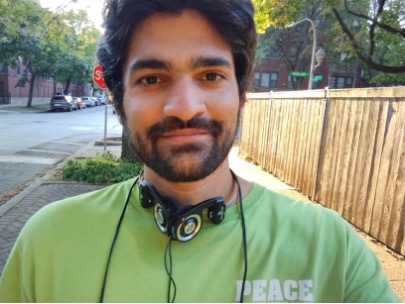
_____________________________________________________________________
[6]
“… In such times, the absence of protest in solidarity with Palestinians would be a cause for concern. Indeed, in holding a sit-in at Rosenwald on November 9, [we sought to] participate in a [long-standing] tradition for social justice at campuses in the United States. The tradition of sit-ins, of course, first emerged in the context of the nonviolent protests in the civil rights movement, including the historic moment in Greensboro, North Carolina, in 1960, when four African American college students from North Carolina A&T State College, Ezell Blair Jr., David Richmond, Franklin McCain, and Joseph McNeil, sat in a store that served whites only. Their actions, built on earlier sit-ins, helped inspire student protests across the country and for generations to come.
The University of Chicago has figured prominently in the early history of sit-ins. In 1962, students held a sit-in on the fifth floor of the administrative building for two weeks to demand that university-owned housing be desegregated immediately. This pressured then-President George Beadle to respond, and, unlike in our current situation, Beadle agreed to a public meeting with the students. In May 1966, there was a three-day sit-in of the administrative building in protest of the U.S. draft policy, which called for universities to release class rank so that students in the bottom half of the class would be subject to the draft. In that event, the University did not discipline any of the protestors and in 1967 decided to not submit class ranks to the Selective Service. In the 1980s, despite protests calling for the University of Chicago to divest from South African apartheid, the University never did; this failure haunts and shames the University still. Years of student and community activism for a Trauma Center at UChicago Medicine, a vital resource for the community addressing a racial disparity in health care access, were essential in making that center a reality when the administration was not responding.
Across all these examples, we can glean a vibrant collegiate tradition of principled student protest, especially sit-ins, that raised vital social justice concerns, that upheld the University of Chicago’s integrity and ethical position when standing administrative policy was unjust. This is the tradition in which I view my own actions and those of other students in Rosenwald on November 9. It is clear to me that, far from a “substantial disruption,” this most recent peaceful sit-in in UChicago’s history was precisely the kind of protest that should be “affirmatively welcomed,” in the words of the 2014 Report of the Ad Hoc Committee on Protest and Dissent. The students seek to sound the alarm amidst the University’s repeated silence and silencing acts so as to call the University to account for its unjustifiable implication in the genocide of Palestinians…”
Kim Kolor, Ph.D. Student in Anthropology
_____________________________________________________________________
[7]
“… I participated in the sit-in on November 9 because it is proven that my University has investments in weapons manufacturing companies, and I could not continue to attend classes and go about my day-to-day without thinking about how the institution I am a part of is facilitating the genocide and displacement of millions of Palestinian people. There is a long and honorable legacy of the sit-in protest being used to peacefully remind large institutions of the harm that they are causing people through their actions, a legacy that was taken up by students of UCUP. And if UChicago, a supposed stalwart of free speech, retaliates against students for taking up this form of protest and trying to communicate with administration at the University they themselves attend, what does that mean about free speech at this institution? Although I can understand the stress this may have placed on the Deans-on-Call, that was not intentional. The stress I experienced for the past several months knowing that my University is invested in companies that build bombs, and the stress that I experienced when the administration repeatedly refused to meet with us to discuss our demands, however, has been caused by the University…”
Sahar Punjwani, Class of 2024
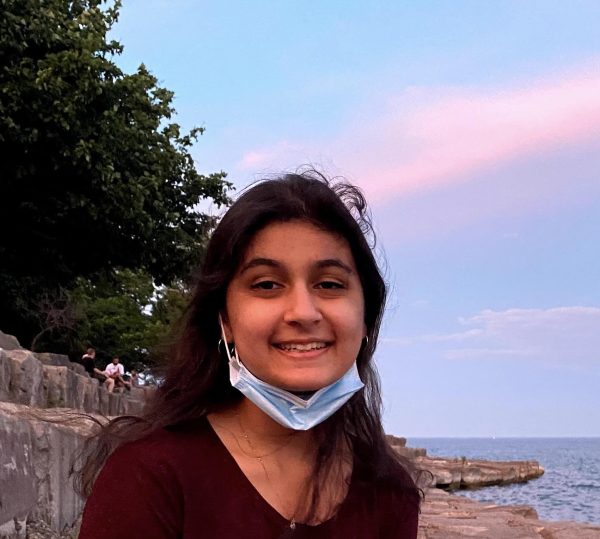
_____________________________________________________________________
[8]
“… As one of the presidents of Phoenix Survivors Alliance, I have understood both the importance of this network of care, and the ways it must be strengthened. I have joined some of my dearest friends in perpetually advocating for this university to own up to the ways it is very actively failing students who are victims of sexual violence and refusing to take easy steps to prevent more students from becoming victims. This is not the focus of my letter, but it is from this position that I know that my choice to advocate for those around me directly makes this university safer for everyone. This university makes a mockery of student conduct by targeting dedicated, caring students while continuing to ignore serious concerns.
I am one of very few indigenous students at this school, a proud leader of the Indigenous Students Association. It is because of this cultural belonging that I cannot take for granted the labor done by those before me to enshrine my place in this university. Protests of many forms, including thousands and thousands of sit-ins, are the reason that I have an opportunity to be at this university; they are the reason I have the capacity to expect truth to be taught about my ancestors in its classes and have the right to voice my disagreement when it is not. My commitment to free expression is not an abstract theoretical choice, but rather a deep connection to the debts I owe those who committed to it before me. The same can, and I suspect will, be said by students of many other affiliations. We cannot forget that just this year we saw one of the worst assaults on the rights of minority students since the ’60s. Now more than ever, I refuse to forsake my community and pretend that protests and demonstrations do not belong at this university….
…In the complaint filed by [Associate Dean of Students] Belinda Vasquez, an administrator [who was not present during the event] we are discussing, it is said that the “business operations of the University” were disrupted…. To me, “University operations” or “University business” includes creating and maintaining a broad array of academic pursuits, support systems, and community spaces. Additionally, it includes adherence to a defining moral philosophy. As I am sure anyone who has worked to refine that philosophy will attest, this is what enables every other function of the University. My university is not a hedge fund, my university is not a diploma mill. Thus, when I define university business, I do not define it through admissions letters and endowment investments—I define it through the promise of the University to be fearlessly committed to academic pursuit and a subsequent commitment to free expression. These are the promises the University makes to itself and to the rest of the world…”
Lukas Borja, Class of 2026
_____________________________________________________________________
[9]
“… The University of Chicago has, in my time here, taught me a lot. This sit-in, my arrest, and your office’s obligation to begin disciplinary proceedings against me, have taught me a lot as well that the University would rather criminalize and punish its students—those most committed not only to values of free expression but also noble pursuits of justice, equality, and liberation, and, as it has not passed my notice, most of whom are Black/Indigenous and students of color, and low-income—than meet with them and be transparent about its investments in arms companies.…
… I believe myself to be an excellent student and upstanding member of the UChicago community. I would never and have never sought to violate university policy. I sought to exercise my right to free expression, as established and championed by the Chicago Principles; and, after having attended the numerous quad tabling events, art builds, and rallies leading up to this sit-in, I felt moved to participate in this sit-in in an abundance of despair over my university’s failure to recognize its role in or even name the Israeli genocide in Gaza, where now over 22,000 Palestinians have been killed. Knowing that a Palestinian child was being killed every 10 minutes, knowing the school year in Palestine was canceled as all schools had been bombed or turned into refugee shelters, I could not continue to merely attend my classes. It is precisely because of my education that I participated in this sit-in; my education here has fostered a young mind that cannot turn a blind eye to the genocide that is taking place with my tuition money…”
Kelly Hui, Class of 2024, Student Marshal
_____________________________________________________________________
[10]
“… As a creative writing and economics double major, much of what I’ve learned at UChicago and what I aim for in my personal pursuits lies in critically examining the workings of
our societal systems and reimagining alternative futures. Especially as an economics major, I am forced to ask myself each day in class when we are taught that the gender wage gap is beneficial to society from an economic standpoint or when we learn about the long-term damage done by the Chicago Economics Department to Latin America—what are the global consequences behind the actions of UChicago administration and alumni? What systems are we complicit in, and what kind of impact are we going to leave on the world? This is a question that I’m sure UChicago is also concerned with as a university, as UChicago claims on its website: “We advance ideas and humanity.”
But what does advancing ideas and humanity really mean? Does this pertain to UChicago’s 0/40 score on the Amnesty International investigation of their investments? How about investing in Lockheed Martin, General Dynamics, and RTX (formerly Raytheon), which all supply weapons to the Israeli government in bombing and enacting an ethnic cleansing against the Palestinian people? Does it involve investing in fossil fuels? The apartheid South African government in the ’80s? The War on Darfur in Sudan in the 2000s? Students have been protesting these issues for the greater part of a century to no response from the administration….
So what does it matter that UChicago claims that it values “a diversity of people and ideas, coupled with free and open discourse, [which] lays the foundation for students and scholars to bring forth original ideas that define fields and enrich human life” when UChicago puts its money in defense contractors that are supplying a state with the weapons to commit war crimes and genocide? What does it matter that UChicago claims to prioritize free and open discourse when it has no transparency in its investments and won’t meet with students to freely and openly discuss where their tuition money goes? Lastly, I ask you: would you want to be complicit in the genocide of the Palestinian people? Would you be complicit in apartheid South Africa? The Holocaust? Would you do nothing?”
Emmeline Song, Class of 2024
_____________________________________________________________________
[11]
“… As the international movement for a free Palestine strengthens, the day is rapidly approaching when people will no longer be able to justify silencing protest of the genocidal, apartheid regime of Israel and its project of ethnic cleansing. When people will be ashamed for having participated, actively or tacitly, in this genocide. When that day comes, the world will not forget the complacency of the University of Chicago, who bankrolled the genocide and stood on the side of the oppressors despite their insistence on “political neutrality.” Furthermore, the University, a famed defender of free speech, will forever be forced to account for the contradiction of arresting 26 of its students, silencing a peaceful protest that was simply asking for a meeting with the administration.
My trust in this university’s priorities has undoubtedly corroded in this process—in how it has treated my protest of the nation’s and university’s complicity in the genocide of Palestinians with silence, arrest, and discipline. And my hope that the University will uphold its ostensible values of free speech and fearless inquiry has similarly withered. But, if there’s even an iota of integrity, of genuine regard for free speech, of concern for the well-being of students, and of concern for the legacy of the school that isn’t clouded by the allure of short-term profit, the University of Chicago should drop its baseless disciplinary case, listen to its students, and end its support of Israeli apartheid and genocide…”
UCUP member, Undergraduate Student, Class of 2025
_____________________________________________________________________
[12]
“As an active member of the intellectual community that is this university, I have felt a responsibility—especially to my academic colleagues in Palestine—to vocally oppose the ongoing genocide of the Palestinian people. Because of this university’s investments and ongoing ties with weapons manufacturers like the Crown family of General Dynamics (whose name appears on our gym and social work school), I have felt the need to direct this vocal critique at the University itself. As a Ph.D. student who works for and is paid by this university, I feel that any broader institutional complicity in the ongoing slaughter translates into my own complicity. I have protested because I feel—viscerally and with a deep sense of disgust—that the blood of my colleagues in Palestine is on my hands….
I wish that this university would not actively harass its grieving students. I wish that the buildings on my campus did not bear the names of war profiteers whose bombs have incinerated buildings on the university campuses of my colleagues. I wish that I did not feel complicit in their deaths through my association with this university. I wish that there were no genocide to protest against and that I could have concentrated on my classes as usual this quarter. I have felt deeply failed by my university over this past quarter, and I perceive this threat of disciplinary action as yet another aspect of this institution’s aiding and abetting of genocide through the attempt to silence dissent.”
Sawyer Martin French, Ph.D. Student in the Divinity School and Anthropology
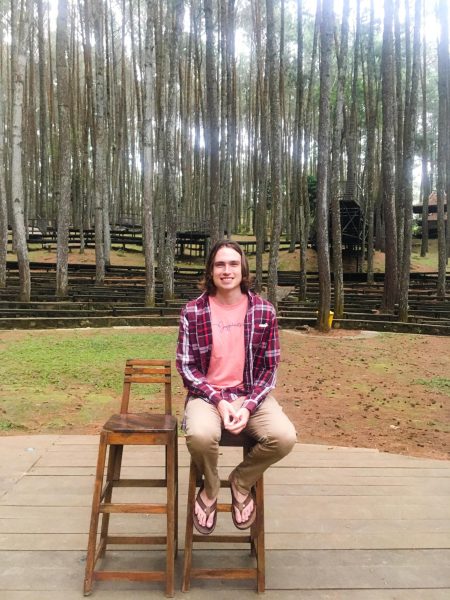
_____________________________________________________________________
[13]
“… So yes, as the contours of this unfolding genocide were becoming clear, I and many other students organized a campaign to combat [the] anti-Palestinian status quo. It is sickening enough to behold this situation as a U.S. citizen—to watch as my government and my co-citizens cheerlead (or else shrug off) the ongoing extermination of a people about whose history, sufferings, dreams, and aspirations they have never bothered to learn. But it is in some ways even more sickening to eat, study, and attend classes at a university known to be ideologically and materially complicit in that extermination: to read stories about premature babies forced off incubators in Gaza while General Elran lectures nearby on the merits of Israeli “counter-terrorism”; to receive texts from Palestinians facing home demolition in the West Bank while the University boasts of its partnership with militarized Israeli universities; to watch the Palestinian death toll rise into the dozens of thousands while the University laments the “loss of life” on all sides and continues to profit from Israeli arms deals.
Our campaign’s demands were simple and, in at least two cases, relatively uncontroversial: (1) a public meeting with the administration regarding its investments in Israeli militarism, (2) a pledge of full transparency about University investments across the board, and ultimately (3) full divestment from Israeli institutions complicit in apartheid, genocide, and occupation. We struggled for weeks to achieve even the first of these three demands. We mobilized daily on the quad demanding a meeting; we called and emailed University administrators attempting to organize one; we even organized a press conference outside Levi Hall and urged President Paul Alivisatos to attend. In every case, the University stonewalled us. Palestinians were being slaughtered by the hundreds daily, and it was clear the administration had absolutely zero interest in discussing, much less grappling with, its role in that reality.
So we decided to escalate by staging a sit-in at Rosenwald Hall. I have been asked to opine on whether I or other students violated Statute 21 of the Student Manual in the process of doing so. So far as I can tell, we did not. But I’m not going to engage in careful exegesis of the Manual’s language or calculate the decibels reached by the voices of students crying out, amid an ongoing genocide, for a public meeting with their complicit, duplicitous, and cowardly administrators. A people is being annihilated, a history erased, a country destroyed—all with the complicity of the University of Chicago. That’s what matters most to me. As a University employee, it’s what should matter most to you [Associate Dean of Students Jeremy Inabinet] too.”
Christopher Iacovetti, Ph.D. Student in Religion and Literature
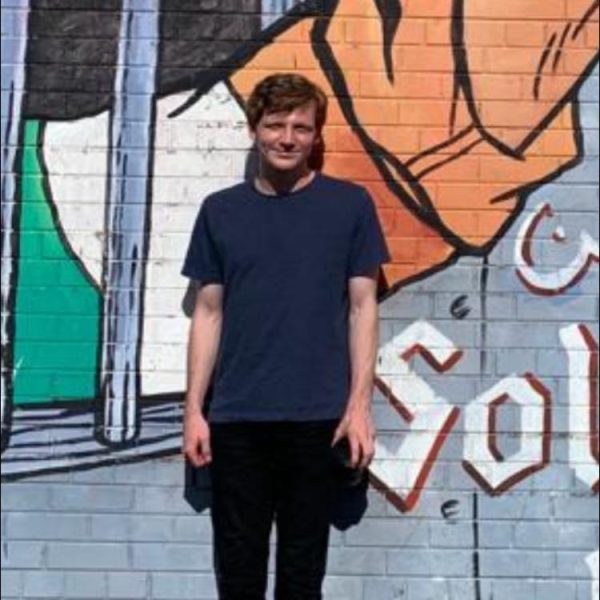
_____________________________________________________________________
Conclusion:
Despite the University’s attempts to silence us, we will continue to speak out in support of the liberation of Palestine and to stand in solidarity with those fighting for justice around the world, from Sudan and Congo to Kashmir and Turtle Island. As students living in the heart of the crumbling U.S. empire, we refuse complicity in the systematic exploitation and destruction of colonized, oppressed, and marginalized people around the world.
We demand that President Paul Alivisatos, Michele Rasmussen, and other administrators uphold their professed commitment to free speech and engage, rather than suppress us quietly through arrest and specious charges for disciplinary action. We renew our call for the University of Chicago to:
- Hold a public meeting between President Paul Alivisatos, other administration and trustee members, and representatives of UCUP.
- Establish mechanisms for meaningful transparency and ethical oversight in University investments.
- Divest fully from weapons contractors and Israeli institutions that perpetuate and enable Israel’s genocide.
Editor’s note, February 9, 2024: This piece was updated to accurately reflect that this action was officially organized by UChicago United for Palestine (UCUP), not Students for Justice in Palestine (SJP).
Editor’s note, February 10, 2024: This piece was briefly removed and then restored in order to anonymize a contributor. The featured photo was also changed.



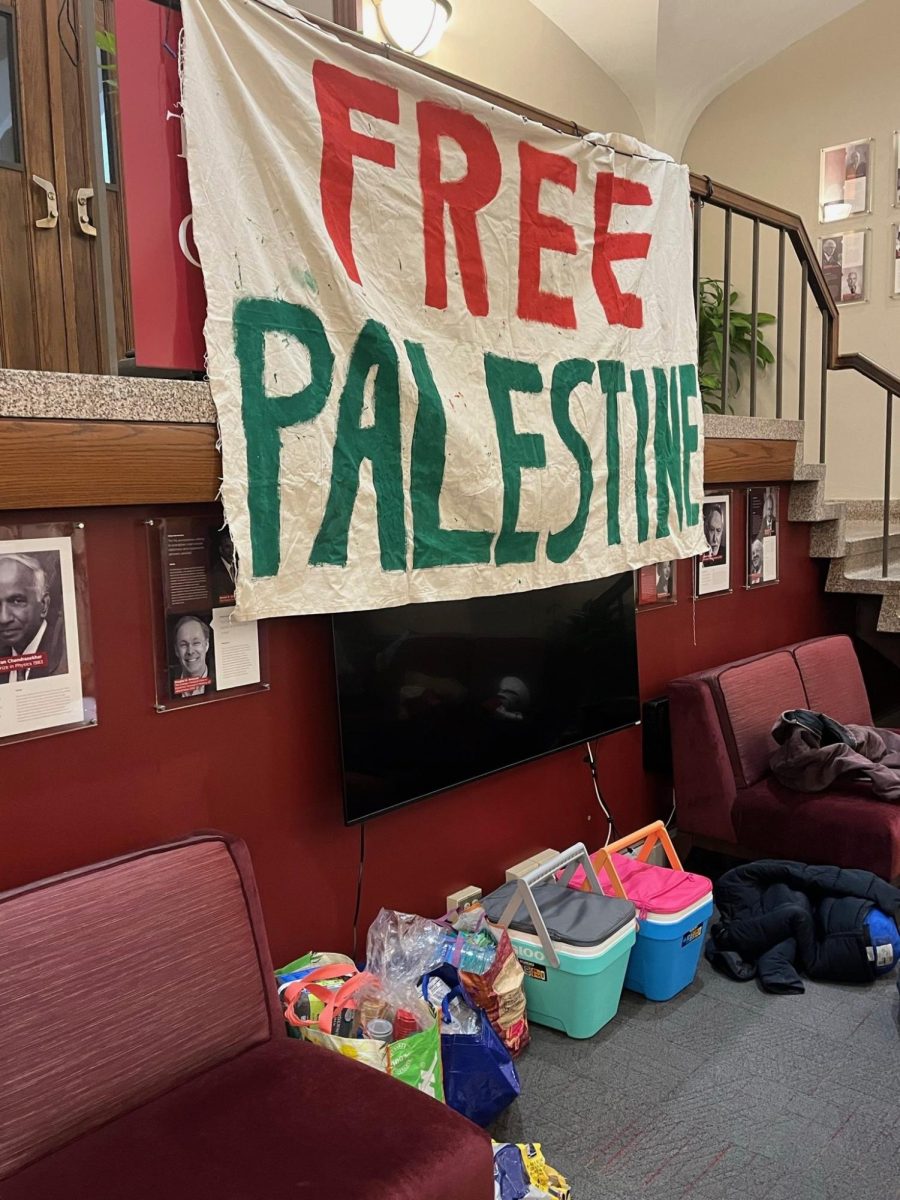









Joe / Feb 13, 2024 at 9:21 pm
Lukas Borja claims to care about Survivors of Sexual Abuse, where is he when Hamas brutally raped women, cut of their breasts while raping them?
Give me a break. You’re all a bunch of terrorist lovers. Hamas spent hundreds of millions of dollars building tunnels and two years planning the attack of Oct. 7th.
If any of you cared about Palestinian lives you woudl be calling for a return of the hostages. Everyone know that releasing the hostages woudl have ended hostilities right then and there.
Why don’t you condemn Hamas?
Why don’t you call for a release of the hostages?
Because your hatred for Israel (and Jews) is more valuable to you than the lives of Palestinians.
As to the actions by the university, you were all warned IN WRITING that you would be arrested, don’t come crying now. The university is not a free for all, you don’t get to dominate university spaces against the rules even if you think your cause is most just. If you don’t like the rules, you can always transfer somewhere else.
Try protesting and breaking the rules in Iran or Gaza under Hamas and see what happens then?
Give me a break with these fake sob stories.
Ini Chow / Feb 14, 2024 at 9:07 pm
This has TOTALLY been debunked as propaganda and lies spread by Mossad whose motto is literally “by way of deception thou shalt do war.” Completely false and yet you regurgitate it like the offal it is while ignoring genocide. You are tge reason genocide happens. Did you cry about the 150,000 Pakestinians wounded from 2008 to October 7, the thousands of Palestinian hostages abducted and tortured, held without trial, the child hostages raped? Where was your outrage then? Easier to vomit lies and propaganda than be a truly moral person.
Joe / Feb 18, 2024 at 9:45 pm
Sorry, which part was the lie?
I'm offended on behalf of your religion / Feb 1, 2025 at 6:41 pm
What a gulf between your on-the-record statements, Joe, with their careful performance of respectability and high-mindedness, and off-the-record comments like this, which reveal a crass and illiberal mudslinger. It’s hard to believe that God (or for that matter, true men of religion) is on board with this, even if it’s purportedly in service of His chosen people.
Stop this nonsense / Feb 11, 2024 at 4:21 pm
Nobody is silencing you, seeing how loudly everyone is hearing you. Occupation of university property and disruption of work are violent acts, not peaceful, and you were given plenty of time to back down before the university started enforcing its own rules half-heartedly. All of you should be expelled.
Uncle Milton / Feb 9, 2024 at 4:30 pm
I blame admissions.
These anti-semitic snowflake lunatics should NEVER, EVER have been admitted to The University in the first place.
Future employers take careful note of each of their names. I did and I am sharing them to lots of the right people.
Keep a trash can nearby when their resumes come to you.
Fair and Even / Jul 11, 2024 at 8:44 pm
It’s a quiet conspiracy. Demanding authorities take action because you “feel uneasy” that they say they don’t want people to be killed or have their homes and land stolen. That dropping millions of tons of bombs on people trapped behind walls and barbed wire, surrounded by snipers, soldiers, tanks, ships is not a war but a vicious slaughter.
You’ve been taught all your life that you have the GOD given right to take what you want (even if you don’t believe in God). And you’ve been trained with the magic arguments and learned to cry the magic tears that turn every argument into your victory of victimhood. So, now you call out to your like-minded contacts to say, let’s hurt their careers – to punish them for dropping bombs on our cities and raping our young boys and men … wait, that’s not what they did .. those were crimes committed by your homeland … the crime these UChicago people made was to speak against vicious massacres. So, now we are learning …. you have decided the entire world is your enemy and future slaves and we should apologize for not sharing your religious or ethnic background and for saying that you have murdered good people and stolen their land for decades, or else you and your contacts in power at various institutions will attack, will cry and will collude to harm those who disagree with you. Whatever “ism” you adhere to sounds pretty ugly and manipulative. Is it a philosophy worthy of the University of Chicago? Does the answer to this question depend on how much money you give the University?